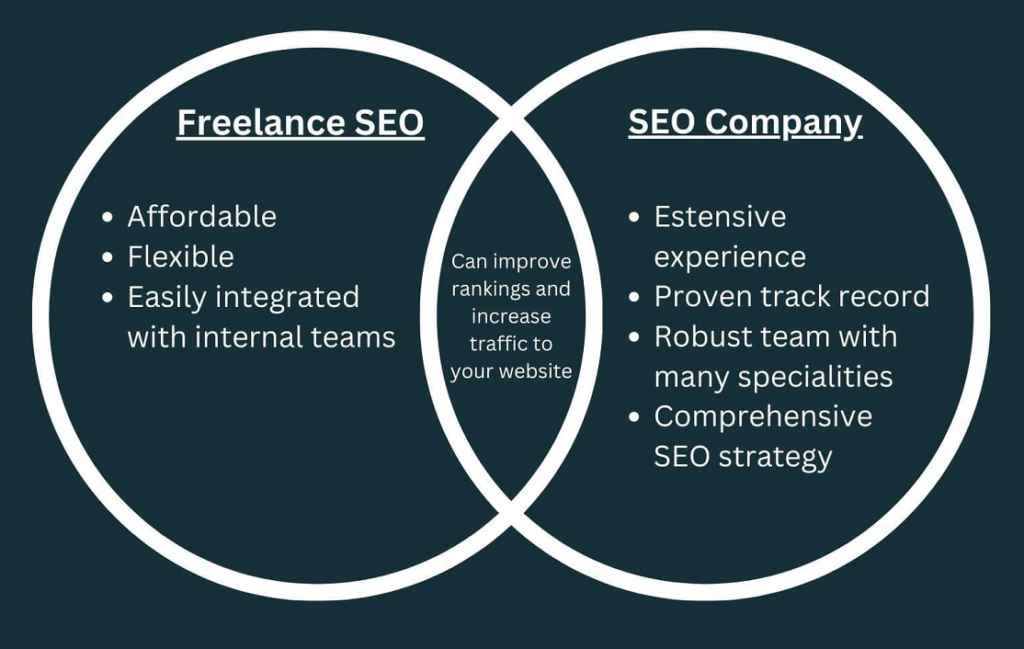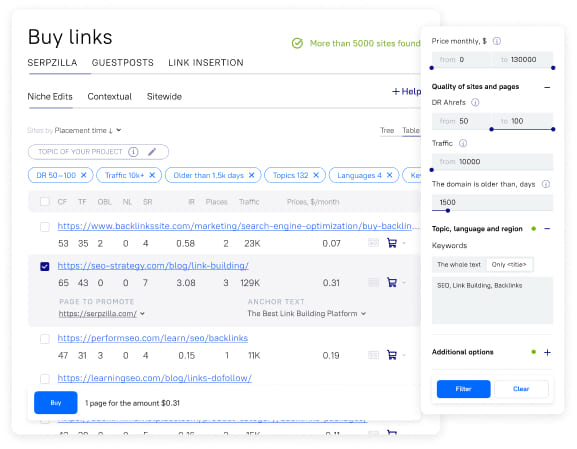What is the right price for SEO services?
The problem of budgeting for SEO is as old as the practice of SEO itself. There is no right or wrong answer, primarily because “it depends” on who is asking.
Clients who use SEO specialists want to know if they’re paying market rates or too much for too little work.
SEO consultants and specialists want to be paid fairly for their efforts. They also want to be able to charge enough for their level of expertise.
Agency managers and business strategists look at it from both sides. They understand that everyone needs to make a decent profit while providing value to the client.
But it is a very rare campaign or project where all of these parties walk away completely satisfied. We here at Serpzilla have a bird’s eye view of these dynamics. We are not an agency or a publisher or a direct SEO service provider. That gives us a unique standpoint to evaluate the needs and efforts of all parties involved – we don’t need to take sides in this discussion.
And with 15 years of rich history in the SEO industry, we feel responsible to share our views and experience on this crucial matter.
There are a gazillion factors that influence the cost of an SEO campaign. On top of that, each factor is very complex, hard to evaluate, and overlaps with a bunch of other factors. Let’s take these one by one and attempt to make sense of them.
Cost Variation in Traditional Website Tasks
Now, SEO is very different from other tasks that go into a website, such as content creation, designing and development. These costs are relatively fixed for various levels of expertise – they vary depending on the geographical region and niche.
For example, you can find a copywriter to write web copy for as low as $1 per 1,000 words to as much as a few hundred dollars for 1,000 words. These charges largely depend on their country of residence, which in turn influences their proficiency over the language.
It works similarly for designers and developers. For development, you probably need a team of coders. These would cost you anywhere from $6 per hour to $180 per hour. Again, more than expertise, the cost depends on where the team member is located.
One thing that’s common between copywriters, designers and web developers is that it is easy to understand their end goal and evaluate the outcome of their efforts. You complete a task and you get the payment agreed upon.
Cost Variation in SEO Tasks
In SEO, it’s not so easy to decide tasks and milestones as it is for these traditional website-related roles. Even setting goals is tricky because the outcome doesn’t solely depend on SEO efforts – it depends on Google too.
The minimum and maximum price you can pay for an SEO campaign also varies wildly. The more work that needs to be done, the more budget you need to allocate.
An SEO specialist doesn’t have a set number (or nature) of activities. She may need to build links, edit copy, create HTML tags, dig into analytics, interact with 5 people in the client organization, create reports, and so on. The mix varies every time.
It’s very tricky to estimate the time taken for these practices. You might think that doing a certain technical SEO task – such as writing meta descriptions for X landing pages or alt tags for X images – can be done in an hour. This is true if the pages or images are similar to each other. But for entities that vary even slightly – such as analyzing non-indexed pages – it might take anywhere from a few hours to a few days!
It is almost impossible to associate the volume of records or pages with the work that needs to be done. It might still be possible for entry-level SEO work or with freelancers, but for a task needing analysis from experienced SEO specialists, solving even a single issue could impact revenue by millions of dollars, regardless of the time it takes.
Agencies vs. Freelancers vs. Consultants
There are different dynamics when it comes to WHO is doing the SEO and how they’re doing it… Is it a package, or a retainer, or a one-time campaign?
A lot of people take on retainers with a fixed base price, like $500 per month. That doesn’t mean the profit of the SEO is $500 – they will need to pay to buy links, run PPC ads, create blog content, or boost social media posts. If it’s an agency, they will get a percent of the costs after deducting the salary of the employee. Some part of the retainer will also go towards training and buying essential SEO tools such as Ahrefs or Screaming Frog.
Many times, SEOs themselves can’t estimate at the outset how much work needs to be done. There are a lot of uncertainties in every project. SEO issues are like layers of an onion – when you peel an outer layer, you get to know if there is yet another layer inside.
Further, the amount of SEO work can’t be distributed evenly over subsequent periods. Just because you have a retainer doesn’t mean there will be the same amount of work each month.
In the first month, SEOs need to do much more than usual – they need to set up tools, perform technical SEO and content audits, tweak content on landing pages, etc. Things start to get stable only from the third month onwards. Again, suddenly in one of the months, a new problem might occur – maybe due to a new Google algorithm update. The SEO will need to make immediate changes. These one-time tasks will also eat into their profits.
Sometimes, SEO agencies will sign on a big brand for very less price just for the privilege of adding them to their client portfolio or to get a foot in the door for larger projects or campaigns. Of course, this is true for pretty much any industry – if you have the chance to bring Coca-Cola on board as a client for the first time, wouldn’t you be willing to negotiate on the price?
There is a perception that the bigger the agency, the more expensive their retainers or campaigns will be. Conversely, freelancers will do the same work for less. This is because the agency needs to pay the employee who works on the project as well as make a profit – they have two pockets while freelancers have only one.
But let’s look at it from another angle. How many projects or campaigns does the agency have compared to the freelancer? How much money do they earn per project? The answer is obvious: many more and much more.
SEO associates working for an agency are not very highly paid. A freelancer might earn more money per project than an SEO associate or even SEO team leader. However, all this doesn’t mean that as a client you need to pay more or less to a freelancer or agency. It is up to them to work out their charges. You pay simply if the outcome seems worth the money to you.

As discussed earlier, SEOs make different amounts of money each month even if they have a retainer, because it depends on a lot of factors which are not always objective. Everyone structures the charges based on what they feel like, how much effort they think is needed, and how they perceive their own expertise.
All said and done, SEO is not a charity. Freelancers, consultants, agencies, all are here to make a profit. If you think your SEO agency or freelancer isn’t making a profit off you, it just means you are not able to see where the commission is hidden. You need to pay closer attention to your contract.
Variables in Link Building
Link building is one of the most expensive activities that eats up a big chunk of your SEO budget.
There are as many link building strategies as there are SEO specialists. Therefore, the amount you pay for each link is not the same, making it difficult to estimate or allocate monthly spend. To complicate matters, while everyone knows that backlinks work, no one can pinpoint the extent to which a link will work and how much your rankings will rise as a result of link building.
Yes, you can get better at estimating with experience, experimentation and studies. You can theoretically say which links will help your site gain authority and which will harm it. There are endless avenues for link building. In fact, good SEOs routinely evaluate more than 30 metrics before they decide whether to get a link or not. Again, the thresholds and preferences for these metrics will vary according to each one’s experience and opinions.
While SEO specialists are contemplating all this, some clients are trying to get into their heads and asking them to report on every link built and every cent spent. They want to monitor every step an SEO takes – from choosing the website to drafting emails to webmasters to changing the formatting of a published article. This is highly impractical and only increases conflict. As outrageous as it sounds, it is unfortunately true.
Yes, being a control freak might increase your SEO team’s accountability but it is very counter-productive. A client whose primary business is not SEO can never fully understand the science of backlinks, its true value, the context it provides to their page, or how it gels with their entire backlink profile. An SEO can’t explain all of this while the need of the hour is to build more high-quality links.
As a client, trying to understand all the dynamics behind choosing a link is not worth your time. You are never going to be an SEO specialist. Checking every backlink is exhaustive work. If one of the backlinks in your 1000-row spreadsheet costs $0.95, will you spend time checking if it is really placed or not? Will you suspect that your SEO put that $0.95 in his pocket? You’ll need to spend at least $10 of your time doing all the investigating. This defeats the purpose of hiring an SEO and skews your link building ROI.
Then again, everything is not in the SEO’s hands. It frequently happens that some publishers are redesigning or performing maintenance work on their website at any given point of time. As a result, some backlinks might disappear for a short (but indefinite) period of time and reappear later, depending on what they’re doing. You can never hope to chase all these variables.
The solution is a tool like Serpzilla, where all the links that you buy are guaranteed – you pay only if they’re placed and stay there. Serpzilla goes a step further and automatically checks whether the pages with the links are indexed. Such features shorten the link building cycle and reduce manual work for both the client and the SEO agency or specialist.
Another piece of advice from us is, when a client and an SEO agency are creating a contract, don’t specify the exact amount of links that need to be bought. Otherwise, the SEO will feel compelled to hit that number every month – they might even try some shady black hat tactics or buy low quality links just to meet the target. Your site will be reduced to a guinea pig in this case.
Link building shouldn’t be seen as a process or a set of activities. It needs to be evaluated on the basis of its outcome – the impact on the website’s rankings.
Website Criteria That Influence the Cost of SEO
Google looks at multiple factors while ranking a web page. Many of these are on-site elements that you can optimize. Of course, the way to evaluate the results of this optimization remains the same as in link building: Are our web pages moving towards the top of the SERPs or not?
There are four main factors of a website based on which you can decide the amount of SEO work that needs to be done on it.
Age of the website
The age of the website or the history of the domain matters a lot. On the surface, the younger the website, the more money you need to promote it. A site that’s newer than 12 months is basically a toddler in kindergarten. Google will index and rank the site, but doesn’t trust it very much. Google’s trust is gained simply through consistency. As their crawler visits your site repeatedly over a period of time, it is reassured that you’re here for quite some time to come.
This first year is a good time to push the pedal to the metal with link building. When you set a steady pace of link building right at the outset, it becomes a benchmark against which Google assesses you. The same goes for your on-page SEO and content strategy too. Resolve all your technical SEO issues and publish a lot of blog posts so that you have enough content on all topics related to your industry.
Remember: you might not see immediate results. Google doesn’t trust you yet, so you need a lot of patience (while maintaining your consistency). Don’t expect your traffic and your sales to grow proportionally to the amount of money you pump in.
But as your website grows older – say after a year and a half – all these bases you’ve built will start to sprout results and make you competitive enough to take on established sites in your industry.
Your target region
The bigger geographical region you target, the bigger your budget obviously. It’s common sense that bigger cities will have more intense competition for your niche than smaller ones. Since 90% of all clicks from Google go to listings on the first page, the rest will lose out simply by not showing up.
For example, if you run a Thai restaurant in London, you’ll be competing with a hundred others, and will need to spend a lot on content, branding and reviews to rank higher for “thai restaurant in london.” On the other hand, if you own a Thai restaurant in a small town like Matheran, you’ll have far less competition – chances are, there will be less than a dozen Thai restaurants in the whole city and you’ll have to beat only two of them to appear on the first page and get a slice of the Google pie.
The exception to this rule is products or services that exist in only the region you’re targeting. The best example is a tourist attraction in the region where you’re operating – one that most, if not all, local businesses are trying to capitalize on. This means competition will be ferocious in that region while there will be none in a large city far from there. Obviously there are more searches for “pyramids tours egypt” (best of luck ranking for this term) and less for “pyramids tours england” (don’t spend on this term) because there are no pyramids in England.
Quality of the website
The quality of the website is one of the most important things in SEO. While it is a fairly simple for experienced SEOs to conduct, it is by no means simple to implement. Each error that needs to be fixed will add to the budget. Depending on the efforts and time taken, the fixes might cost more or less.
If it’s an established website that is audited regularly for SEO errors, then the SEO agency can proceed directly to strategies such as content creation or link building. This reduces the spend on technical SEO and your site can get to the top faster.
Size of website
The bigger a site is, the more you need to spend on SEO, right?
Not necessarily. The cost of promoting a site doesn’t depend on the total number of pages it has; it depends on the number of pages you want to promote.
This puts control of the spend directly in your hands.
For each page that you want to promote, you need to associate it with a primary keyword (and a few secondary ones). Then find out the search volume and competitiveness (difficulty) of that keyword. The higher these figures, the more you’ll have to spend.
If your keywords are competitive, you’ll need to build more backlinks to them. These links will also be costlier than those from websites in less competitive industries. You need to take these factors into account and estimate the cost for promoting each page.

Over to You
We started out this article by addressing all parties in the SEO mix – specialists, consultants, agencies and clients. But our concluding message is aimed at the person who is shelling out the payment: the client.
It bears repeating – SEO is a very complex thing to do. Not all tasks are easy to break down or explain. Or even guaranteed to work. Even SEOs don’t fully understand the impact of SEO because of the opaqueness of Google’s search algorithm – in fact, Google deliberately misleads SEOs (perhaps, to avoid being spammed) in many cases.
A lot of specialists across the world are constantly trying to analyze traffic, create new tools and calculators, build different models, approaches and scoring systems. In most cases, these end up as failures because they don’t work in many situations.
Since there is no standardized system for carrying out SEO, there is no standard fee structure. That’s not to say articles like this are useless of course – we’ve put in so much research and gone in-depth just to help you look at this crucial matter from every possible angle. You can use it as a handbook and guide to SEO payments.
Now you know what kind of reports to ask for and what not to ask for. You can make an informed call on whether your money is being spent wisely and offer constructive suggestions to your SEO team on budgeting for links and content. This way, you minimize the chances of being duped with run-of-the-mill or harmful SEO.
A final message to SEO specialists: You are like a guide in a wild jungle who wants to deliver their client to safety. You have developed your own ways of surviving without being eaten, drowned or poisoned.
While you have your own way of navigating this jungle, you need to understand that it might not be the shortest or best route. And every client doesn’t have the same goal for visiting the jungle – some might want to go hunting, others might want to gather fruits and yet others might want to camp by a river. You need to understand exactly what they want and then chalk out a plan to make it possible.




![Link Building Pricing Guide [2026]](https://serpzilla.com/blog/wp-content/uploads/2025/12/Link-Building-Pricing-Guide-540х360.jpg)




